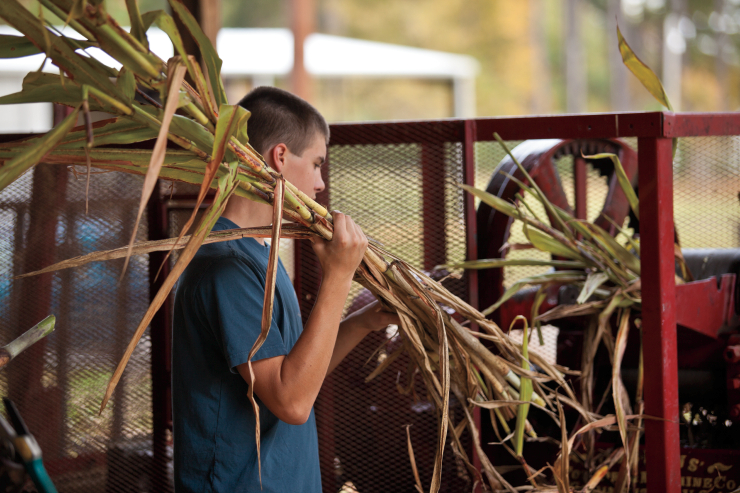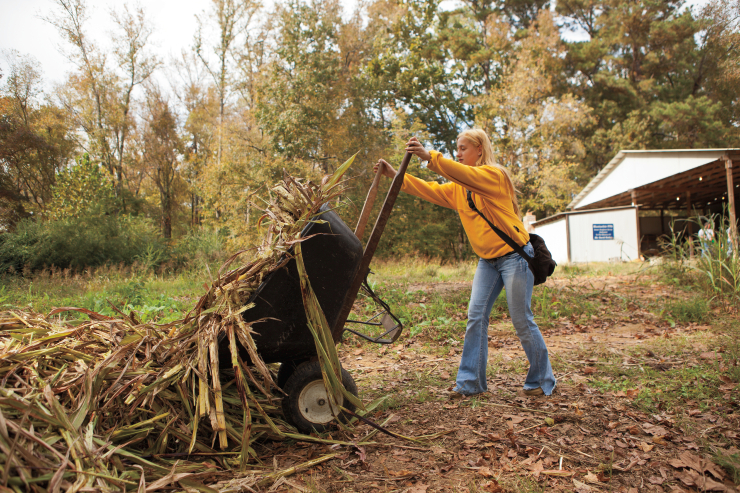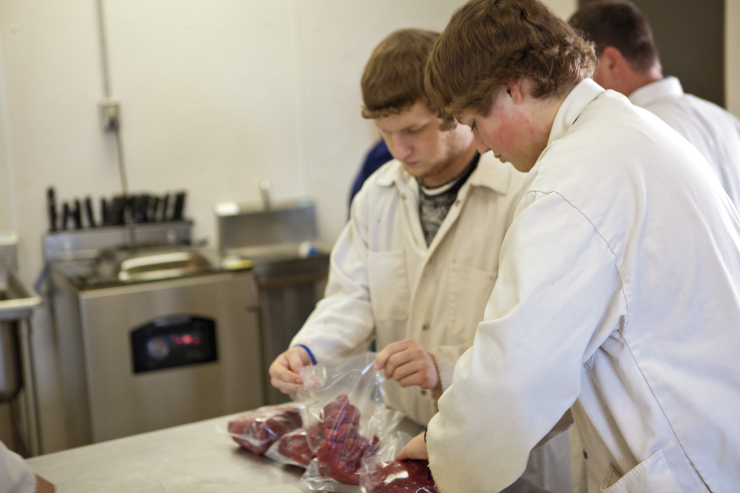Home > Mississippi > Mississippi Ag Education > Schooled in Agriculture
Schooled in Agriculture
In partnership with: Mississippi Department of Agriculture and Commerce
 At Mantachie High School in northeastern Mississippi, agriculture education has a long and proud tradition. Each year, scores of the school’s 350 students take classes in introduction to agriculture science, forestry and meat science. And for the last 25 years, every one of those students has also been active in FFA. It’s what C.W. Franks says separates Mantachie’s curriculum from others. “We consider our work with students to be a program, not just classes,” says the school’s FFA adviser and meat science teacher. Other components of the program include showing cattle, managing three greenhouses, growing and selling sorghum and even operating a deer processing facility. “It’s not just about passing on knowledge to them and getting them to understand it. It’s about preparing them to be well-rounded citizens and partners in the agriculture community.” He says the FFA experience is integral to achieving that goal. “We have a very committed group of young people in our FFA chapter. FFA provides them with leadership opportunities, competitions and real-life experiences you can’t get from a book.” It’s so important, that Franks says they even have students remain in the FFA chapter after they’ve graduated. Franks knows what he’s talking about. A 1978 graduate of Mantachie, Franks has been teaching at the high school since 1989. The other agriculture teacher at Mantachie, Joe Rogers, joined the faculty in 2004. He’s also a Mantachie graduate and a former student of Franks’. “Many of our students get jobs in meats or ag education or ag engineering,” says Franks. “But we also have doctors, lawyers, pharmacists and others who were part of our program and our FFA chapter who continue to tell us that the leadership and management skills they learned help them in their business today.”
At Mantachie High School in northeastern Mississippi, agriculture education has a long and proud tradition. Each year, scores of the school’s 350 students take classes in introduction to agriculture science, forestry and meat science. And for the last 25 years, every one of those students has also been active in FFA. It’s what C.W. Franks says separates Mantachie’s curriculum from others. “We consider our work with students to be a program, not just classes,” says the school’s FFA adviser and meat science teacher. Other components of the program include showing cattle, managing three greenhouses, growing and selling sorghum and even operating a deer processing facility. “It’s not just about passing on knowledge to them and getting them to understand it. It’s about preparing them to be well-rounded citizens and partners in the agriculture community.” He says the FFA experience is integral to achieving that goal. “We have a very committed group of young people in our FFA chapter. FFA provides them with leadership opportunities, competitions and real-life experiences you can’t get from a book.” It’s so important, that Franks says they even have students remain in the FFA chapter after they’ve graduated. Franks knows what he’s talking about. A 1978 graduate of Mantachie, Franks has been teaching at the high school since 1989. The other agriculture teacher at Mantachie, Joe Rogers, joined the faculty in 2004. He’s also a Mantachie graduate and a former student of Franks’. “Many of our students get jobs in meats or ag education or ag engineering,” says Franks. “But we also have doctors, lawyers, pharmacists and others who were part of our program and our FFA chapter who continue to tell us that the leadership and management skills they learned help them in their business today.”  Fostering Leadership Skills Mississippi FFA State President Kristen Bishop of Nettleton can attest to the benefits of the FFA experience. “Leadership skill development is one of the most important ways FFA prepares students for college ag programs and ag careers,” she says. “Students get the concepts in the classroom. FFA supports that learning, and also helps them develop business skills and people skills to help them be successful.” A member of the Nettleton FFA, Bishop began her FFA experience when she started raising meat goats. After she completes her term as state president and the internship at the Mississippi Department of Agriculture and Commerce that goes along with that title, Bishop is hoping to pursue a career as a high school agriculture teacher. Another group that fosters an appreciation for and skills development in agriculture is 4-H. The Mississippi 4-H program provides hands-on educational experiences for young people so that they can learn leadership, citizenship and life skills. Programs are delivered throughout the state by local county extension offices and trained volunteers. Students complete projects on topics including gardening, livestock, poultry, horse judging, entomology and forestry, among others.
Fostering Leadership Skills Mississippi FFA State President Kristen Bishop of Nettleton can attest to the benefits of the FFA experience. “Leadership skill development is one of the most important ways FFA prepares students for college ag programs and ag careers,” she says. “Students get the concepts in the classroom. FFA supports that learning, and also helps them develop business skills and people skills to help them be successful.” A member of the Nettleton FFA, Bishop began her FFA experience when she started raising meat goats. After she completes her term as state president and the internship at the Mississippi Department of Agriculture and Commerce that goes along with that title, Bishop is hoping to pursue a career as a high school agriculture teacher. Another group that fosters an appreciation for and skills development in agriculture is 4-H. The Mississippi 4-H program provides hands-on educational experiences for young people so that they can learn leadership, citizenship and life skills. Programs are delivered throughout the state by local county extension offices and trained volunteers. Students complete projects on topics including gardening, livestock, poultry, horse judging, entomology and forestry, among others.  Lessons That Make the Grade In addition to specialized high school ag classes, FFA experiences and 4-H opportunities, Mississippi students are also introduced to agriculture through the state’s Ag in the Classroom program. This program encourages educators to teach more about our food system, as well as the critical role that agriculture plays in our economy and in our society. That encouragement comes in the form of new methods, materials and activities meant to simplify, improve and enhance classroom instruction. An initiative of the Mississippi Farm Bureau Federation, the Ag in the Classroom program started more than 20 years ago. At the time, leaders in the Mississippi business, agriculture and educational communities saw the need to foster a greater understanding and appreciation for the agriculture industry. Schoolchildren were becoming more removed from the ag economy, and the supplemental teaching materials were developed to help bridge that gap. “There are so many children who aren’t connected to agriculture at all, and yet everything we have has some connection to agriculture,” says Clara Bilbo, coordinator of the Ag in the Classroom program. “We have units on every commodity from cotton to turnip greens to honey to corn. We have lessons on biotechnology and how it connects to agriculture, and we have materials that cover ag careers.”
Lessons That Make the Grade In addition to specialized high school ag classes, FFA experiences and 4-H opportunities, Mississippi students are also introduced to agriculture through the state’s Ag in the Classroom program. This program encourages educators to teach more about our food system, as well as the critical role that agriculture plays in our economy and in our society. That encouragement comes in the form of new methods, materials and activities meant to simplify, improve and enhance classroom instruction. An initiative of the Mississippi Farm Bureau Federation, the Ag in the Classroom program started more than 20 years ago. At the time, leaders in the Mississippi business, agriculture and educational communities saw the need to foster a greater understanding and appreciation for the agriculture industry. Schoolchildren were becoming more removed from the ag economy, and the supplemental teaching materials were developed to help bridge that gap. “There are so many children who aren’t connected to agriculture at all, and yet everything we have has some connection to agriculture,” says Clara Bilbo, coordinator of the Ag in the Classroom program. “We have units on every commodity from cotton to turnip greens to honey to corn. We have lessons on biotechnology and how it connects to agriculture, and we have materials that cover ag careers.”  There are units for every grade level from kindergarten through high school, she says. They include everything from lesson plans and activity books to posters and even an ag Jeopardy game. Bilbo says counties often purchase the units for a classroom or a school. In the future, many of the materials will also be available as online lessons. “Schools are a very important asset in expressing the importance of agriculture across communities within our state. When you tell 10 students in the classroom, they go home and tell several more. So you have an opportunity to make a big impact by educating a lot of people.”
There are units for every grade level from kindergarten through high school, she says. They include everything from lesson plans and activity books to posters and even an ag Jeopardy game. Bilbo says counties often purchase the units for a classroom or a school. In the future, many of the materials will also be available as online lessons. “Schools are a very important asset in expressing the importance of agriculture across communities within our state. When you tell 10 students in the classroom, they go home and tell several more. So you have an opportunity to make a big impact by educating a lot of people.”



